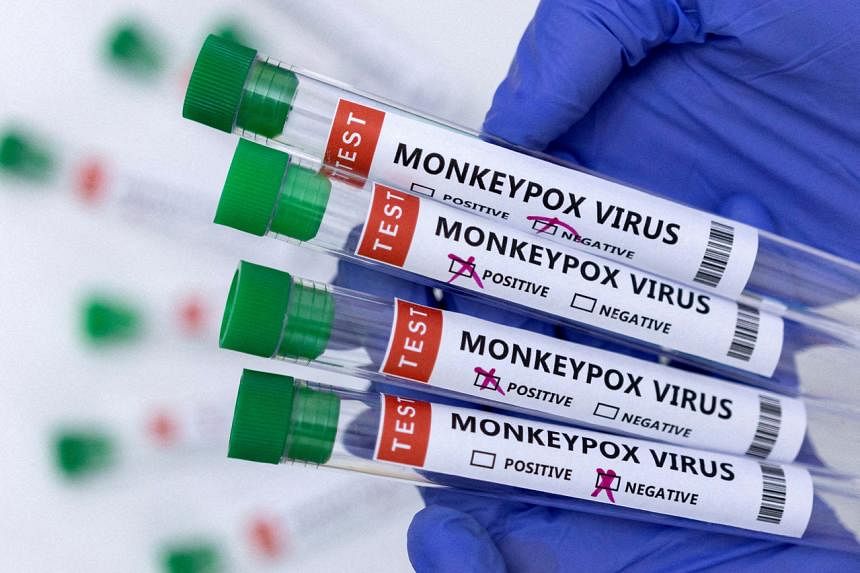SINGAPORE - Two more cases of monkeypox were reported on Sunday (July 24), one a 46-year-old man from Estonia and the other a 26-year-old Singaporean man.
This brings the total number of cases detected here to eight, comprising four local and four imported cases. None has been linked to another.
In updates on monkeypox on its website, the Ministry of Health (MOH) said the Estonian man came to Singapore from London on July 21. He tested positive for the disease on Sunday after developing rashes in the groin area, and had fever and swollen lymph nodes.
The Singaporean man developed rashes in the groin area as well as other parts of his body, and also tested positive on Sunday. Both of them were taken to the National Centre for Infectious Diseases and are in stable condition.
The World Health Organisation (WHO) on Saturday declared monkeypox a global health emergency, with more than 16,000 cases confirmed in 70 countries and territories worldwide.
It is the strongest call to action that the global organisation can make, signalling a new sense of urgency and scale of a disease that had previously been primarily found in western and central Africa. Covid-19 was given the same label back in 2020.
In a statement to The Straits Times on whether Singapore will change domestic or border restrictions following WHO’s decision, MOH said the authorities have already put in place the majority of WHO-recommended monkeypox measures since May.
These include protocols for isolating confirmed cases and quarantining close contacts for 21 days from the date of exposure. Lower-risk contacts are put on phone surveillance for 21 days, the maximum incubation period for the virus.
MOH said the healthcare system has the expertise and capability to effectively test, diagnose and treat monkeypox infections. It has been engaging those who are more at risk, which studies have shown are mostly men who have sex with men.
Professor Roy Chan, founder and president of non-profit organisation Action for Aids, said it is important to raise awareness of the infection in the gay and bisexual community without making moral judgment, so that those who are infected feel safe to seek treatment when symptoms surface.
He said: “We don’t want to stigmatise the disease, stigmatise the people who are potentially infected. Otherwise, it is driven underground and that is where the threat lies.”
Comparing the wave of monkeypox infections with the Aids epidemic in the 1980s and 1990s, he said the two diseases, while affecting the same community, have notable differences.
Prof Chan said: “HIV, in the early days, we didn’t know what it was until a few years later.”
The human immunodeficiency virus (HIV) causes Aids, or the acquired immune deficiency syndrome.
“Monkeypox, we know exactly what it is. There was also no treatment for HIV and it was almost universally fatal. It had a much longer period of (being) asymptomatic when its spread was possible, unlike monkeypox, which is short and clears on its own,” he said.
A study published in the New England Journal Of Medicine last week said 95 per cent of monkeypox cases were transmitted through sexual activity. It is, however, not a sexually transmitted infection in the traditional sense as it can also be passed via close physical contact.
Professor Dale Fisher, who is on the WHO's Global Outbreak Alert and Response Network, noted that the impact of monkeypox is unlikely to be on the same scale as that of Covid-19.
“With Covid-19, it was serious, unusual, impacted international trade. Much of those aren’t ticked for monkeypox. Most people don’t regard it as likely to impact international trade. There has been five deaths out of the 16,000 cases, so it is not overly lethal,” said Prof Fisher, a senior consultant at National University Hospital’s Division of Infectious Diseases.
WHO’s decision to call it a global health emergency is primarily a call to action, shaking up countries that might have been underestimating monkeypox’s spread, he added.
“The decision doesn’t create a whole lot of money or activity... But the longer you don’t call it a public health emergency, it may be interpreted by some countries as ‘Okay, it is not something we need to worry about’,” he said.
Health Minister Ong Ye Kung on Monday said in a Facebook post that each monkeypox case so far typically generates three to four close contacts who require quarantine - unlike Covid-19, which may generate up to 20 quarantine orders.
The ministry is closely monitoring developments, he said.
“As of now, given the self-limiting nature of the disease, MOH does not recommend the mass vaccination of the whole population against monkeypox because the benefits do not outweigh the risk,” he added.
Monkeypox symptoms include rashes, fever, muscle aches, chills and swollen lymph nodes.
For most people, it is a mild infection that resolves itself within three weeks, although it is more of a concern among vulnerable people with weakened immune systems or women who are pregnant.



